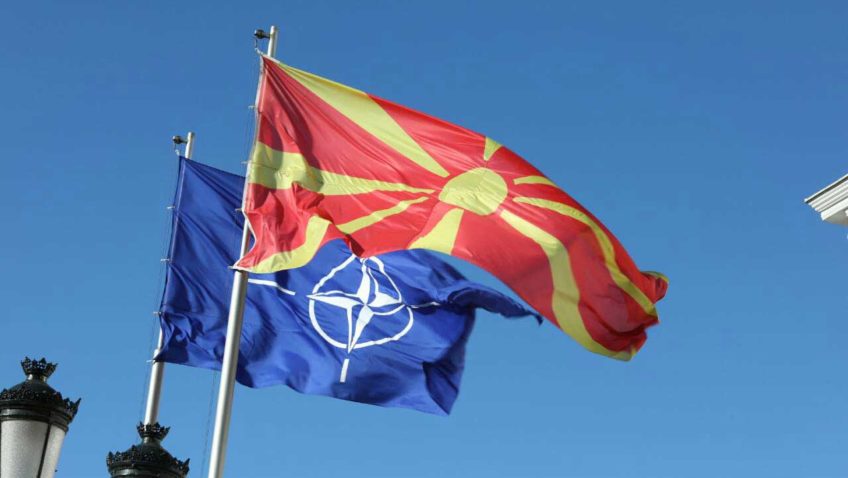Compiled by Eva Jovanova and Hristo Voynov
1. The Greek Parliament ratified the NATO Protocol of North Macedonia anytime now. This comes after Macedonian Foreign Minister, Nikola Dimitrov, signed the NATO accession protocol in Brussels this Wednesday. Greece is the first country to ratify it in its parliament, and this will finally put an end to North Macedonia’s international isolation. The ratification means putting the Prespa agreement into effect.
2. The main right-wing Hungarian opposition party Jobbik has been fined by the State Audit Office for illicit party financing. The fine is for €851,000 which risks bankrupting the party. Jobbik claims that this is a politically motivated action meant to remove opposition from Prime Minster Viktor Orban’s FIDESZ party. Because there is no option to appeal to the State Audit Office’s decision, Jobbik is in a difficult position, with its only real recourse being for the Eurosceptic party to appeal to European courts. It has since decided to convene a party-wide congress to discuss the future course of action. Party leader Tamás Sneider has vowed to continue his opposition to Viktor Orban.
3. The 2019 Freedom House report notes a democratic backslide in Serbia, and partly free systems in other Balkan countries. From free in 2017, Serbia was now evaluated as a partly free country. Except for the EU member states in the Balkans (Croatia, Slovenia, Bulgaria, and Romania), all other countries were ranked as “partly free.”
4. Czechian Prime Minister Andrej Babiš has hit his first firm legal challenge to his office. A local city council has deemed that his massive media and Agrofert holdings while in office are breaching conflicts of interests. The city council of Černošice is from a minor municipality of 7,000 citizens, so the level of the court combined with the importance of the decision makes this unusual, but the case was taken to that council because Babiš is registered as living in Černošice. This judgment is likely to go to a higher court, especially since Babiš has already appealed it.
5. Kosovo and Serbia are still far from reaching an agreement on border correction/Kosovo’s recognition. The US urged the two countries to reach an agreement by the end of this year, while no final decision has yet been made within the two countries. Kosovo is internally split, with its Prime Minister publicly refusing some of the land swap proposals that the Kosovo President had come up with, whereas Serbian high officials portray their position on solving the issue as “reliable and constructive.”
6. Slovakian Interior Minister Denisa Saková has split up the investigation into the murder of journalist Ján Kuciak and his fiancée Martina Kušnírová into multiple investigations. One will look at the original murder, while another will look at a related planned murder of prosecutor Maroš Žilinka, and lawyer Daniel Lipšic, who represents Kuciak’s family. This is a strange move, but excuses given include an attempt to ensure that conflicts of interest issues with the original investigation are dealt with and to minimize leaks by keeping information compartmentalized. Lipšic has expressed his skepticism, as he trusts the original investigative team and thinks this might be used to limit its powers.
7. Bosnia and Herzegovina signed an agreement with the European Border and Coast Guard Agency that allows the agency to deploy its teams in the country. The agreement also provisions joint operations between BiH and the Agency in the event of an unexpected migratory challenge. This helps the EU better protect its borders, as BiH is in its immediate neighborhood, sharing a border with Croatia. The agreement is a part of the Commission strategy to enhance the EU engagement with the Western Balkans and ensure a credible enlargement perspective for the region.
8. An aggressive protest against Magdalena Ogórek, a Polish TV personality, and previous left-wing presidential candidate, took place when she was trying to leave her work in her car but was blockaded by angry protesters. While she was not hurt, the incident was labeled as an attack because of the angry rhetoric used and the ambush tactics used by the protesters and is now under investigation. This occurred shortly after the country was shocked by public murder of Gdańsk’s mayor, both of which have revealed the underlying political tension in the country. Ruling politicians and opposition figures have all denounced the attacks, but it is unlikely to diffuse said tension.
9. Montenegro and Albania joined the EU sanctions against Russia. Norway and Ukraine jumped on board too. The four countries aligned themselves with the Council of the European Union declaration over Russia’s actions in Donbas aimed at destabilizing Ukraine. They were prolonged until July 31, 2019.
10. Ukraine’s Rada, or parliament, has finally adopted various constitutional amendments that state the country’s goals of joining the European Union and North Atlantic Treaty Organization. These changes are not definitive by any means necessary, as the only actual difference is that the country’s strategic interests are now explicitly expressed in the constitution. The US welcomed this development, though it is unlikely to change the already positive working relations between Ukraine and its eastern neighbors in NATO and the EU.


0 comments